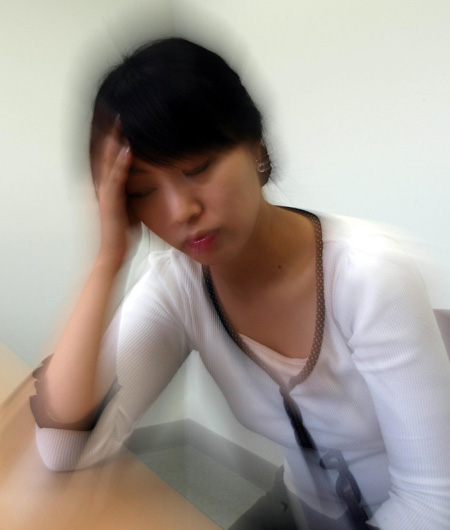- California Assembly OKs highest minimum wage in nation
- S. Korea unveils first graphic cigarette warnings
- US joins with South Korea, Japan in bid to deter North Korea
- LPGA golfer Chun In-gee finally back in action
- S. Korea won’t be top seed in final World Cup qualification round
- US men’s soccer misses 2nd straight Olympics
- US back on track in qualifying with 4-0 win over Guatemala
- High-intensity workout injuries spawn cottage industry
- CDC expands range of Zika mosquitoes into parts of Northeast
- Who knew? ‘The Walking Dead’ is helping families connect
Dizziness may be symptomatic of ear issues
By Yoon Ja-young
If you suddenly feel very dizzy, which clinic should you go to? Some may think about internal medicine or neurosurgery, but in reality they should visit an ENT clinic first, according to Prof. Choi Ick-soo at Inje University Seoul Paik Hospital.
“People generally think they have anemia or serious problems like a brain tumor or cerebral hemorrhage. Few people think they feel dizzy because of their ears. However, in case of severe dizziness that makes people visit hospitals, anemia is not very common, and brain tumors or cerebral hemorrhages are even rarer. Ear problems are the most common cause,” the doctor said at a lecture on dizziness, Tuesday.
When you visit an ENT clinic for severe dizziness, the doctors will check the eyes first. “We need to see through magnifying glasses if the pupils are contracting and dilating randomly. Sometimes we use a computer to check the movement,” Prof. Choi said. So why do pupils move like this? He explained that it is due to the link between the ears and eyes in our body’s balancing mechanism.
Ears and eyes linked in balancing mechanism
“Our body has a sense of balance. We don’t feel dizzy when we are well balanced, but if we lose the ability, we start to feel dizzy and the pupils react.” He explained that for the body to maintain its balance, diverse parts play a role. “The senses of the feet should be normal, the eyes should see, the brain should work…The most important thing here is that the part our ears play is very critical,” he said.
He pointed out that we still sense our body falling when we ride on a rollercoaster with our eyes closed. After spinning round and round on the same spot, we feel dizzy even if we have stopped. This is all because of the ears, according to the professor.
Our inner ear has the cochlea, three semicircular canals and vestibule. The latter two play the role of maintaining balance. “Think of an inclinometer comprising of a bubble in a liquid. It’s the same with the ears. There is fluid in there, which flows as our body moves. The flow of the water tells whether our body is balanced or not, just like the inclinometer.”
“As the fluid flows in the inner ear, the hair cells there sense the flow, and send a signal to the muscles that control the pupils so that they can react accordingly. When this balance system has a problem, the pupils will react regardless of balance, making us feel dizzy.”
Ear diseases causing dizziness
There are a few diseases in the ear that cause dizziness. Otolithiasis, Meniere’s disease, and vestibular neuritis are the most common.
In otolithiasis, tiny stones that flow with the fluid in the ears accidentally enter the three narrow semicircular canals. For treatment, doctors move the stones out of the narrow canals. “The stones enter the canals when there is a shock inflicted on the head, or when one shakes the head too severely, doing dance or exercise, or enjoying rides in amusement parks. One should take care not to let the stones get in there,” the professor said.
Meniere’s disease, meanwhile, is due to abnormal fluid levels in the ears. Patients usually get medicinal treatment, but Prof. Choi said it often recurs. “The patients should go on a low-sodium diet, restrict caffeine, alcohol and cigarettes, refrain from overwork and take adequate rest.”
The professor added that some people, especially senior citizens, suffer dizziness without any specific reason. He recommended that vestibular rehabilitation exercise, which enhances gaze stability and postural stability, can help them get over the problem on their own.














Dr Michael T Burcon, BPh, DC
May 7, 2016 at 7:36 AM
Balance disorders often come from old concussions or whiplash injuries. I am presenting my treatment protocol at Barany 2016 next month at the Grand Intercontinental, Seoul. I will offer consultations to patients with diseases like Meniere’s.